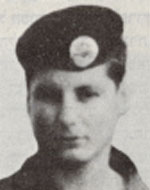Eyal, son of Gila and Ze’ev, was born on May 2, 1950, in Kibbutz Ayelet hashachar, Eyal was drafted into the IDF in early November 1968 and assigned to the Armored Corps. From the time he was a child, he knew that his future would be connected to the IDF and that he would follow in his father’s footsteps and completed a series of professional courses, He was initially stationed in Sharm el-Sheikh and was then transferred to the Golan Heights at his request to serve in an operational unit: “Eyal was a good friend,” his friends told the unit. To the smallest detail. But most of all he was faithful to the house, the friends and the army. As a guide, he was not satisfied with “showing from above.” He turned around and did everything with them. He would get up early in the cold, patiently taking out the people, training them, running a team of counselors, sometimes spoiled, and working a lot. It is not acceptable for them to say thank you to the commander, but Eyal approached people and thanked him for the way he worked with them. “At the outbreak of the Yom Kippur War, Eyal was on the northern front, and the story of his battles and his unit, The Syrian sector was thickened on the eve of Yom Kippur. On the morning of the holiday, the commanders of the sector – Golani and Shiryon officers alike – went up to the outposts in the north of the adjacent plateau to get a closer look at the situation and check the alert on the ground. A few hours later the war broke out and Eyal was on his way back to the post – at the head of his tank company, which was assigned to help the outposts and block the Syrians’ way, Who were trying to break through the direction of a restaurant in the north, as if they had forgotten during the tumultuous war, the anxious attention concentrated on the bitter battle in the south of the sector, above the bridges. This war. “The signal was given at the top of the twenty planes, which suddenly dived over the narrow sector, and at the outpost everyone assumed that they were” ours. ” BAnd another release of the bombs from the aircraft. It was the “MiGs” group and Eyal’s company, which felt at the time for the front line, met him on the way. They fired from all the tools – and missed. Then the Syrian artillery began to operate. The tank company did not pause to wonder about the divers. Eyal decided to get to the line, and quickly. He ran forward with his tank. And indeed, on the line of fortifications between these outposts, his men discovered an enemy tank company. When he reached the area surrounding one of the outposts, Eyal took command. It was necessary, he knew, to defend the outpost and even more necessary to block the enemy’s way of trying to advance toward a restaurant. He managed the connection, alone to the northern observation post, closest to the enemy forces, which controlled the area. The Syrian artillery position on this position has become increasingly accurate. The platoon sergeant at the post called out to him: “They must have discovered the position. Eyal, who according to the testimony of his tank driver, refused to close the shelves in order to be better in sight and range, replied: “We need an artillery range. Those were his last words. On the afternoon of Sunday, October 7, 1973, he was injured and fell. On that day, the Syrians’ attack on the northern line of outposts was broken. “On October 6, 1973, Major Eyal Shacham, a company commander in the northern sector of the Golan Heights, was awarded the” Medal of Honor “by the Chief of Staff, Lieutenant General Mordechai Gur. Upon the outbreak of the battles, he commanded a northern outpost, fought a few battles with the few tanks he had in his possession, and managed to stop the Syrian armor from advancing to a restaurant, killing him with courage, courage and resourcefulness. And managed to encourage his soldiers even during the most difficult times. ” “Eyal ran the company and fired the artillery, but there was also a reporting station, he got all the calls from the northern post and passed them on,” said Eyal’s tank driver, who was the only surviving crew member. I loved him more than any company commander I had. “Eyal was brought to rest in the military section of the cemetery in Kiryat Shaul and left behind a wife, parents and sister, and after he fell, he was promoted to the rank of major.
